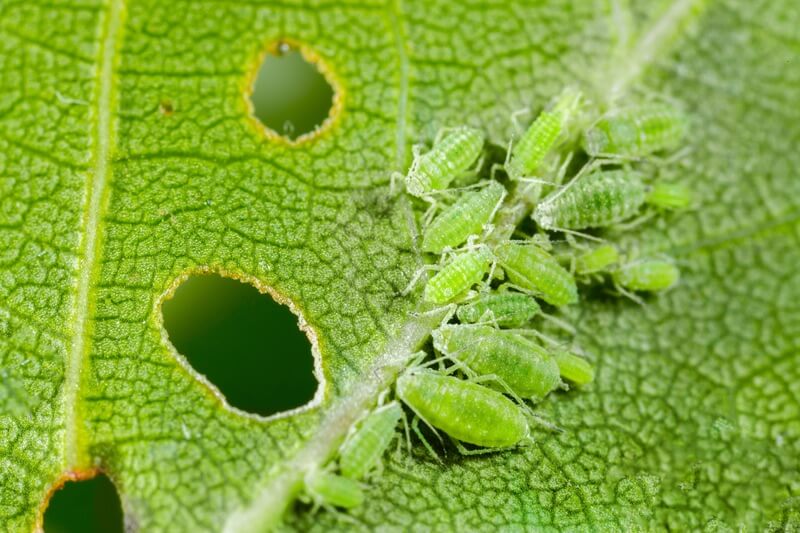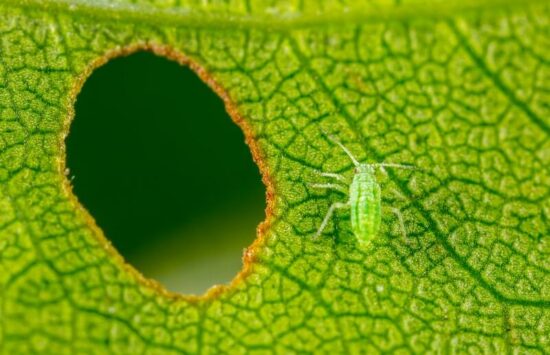Aphid bites are commonly misunderstood by gardeners and homeowners all around the world. These little insects are everywhere, but many people don’t know a thing about them!
This guide will cover everything you need to know about aphid bites and if they’re harmful to humans.
Table of Contents
Do Aphids Bite?
Gardening, as rewarding as it can be, has the potential to expose you to any number of insects that bite, sting or cause skin eruptions and rashes. If you find yourself dealing with post-gardening skin woes, it can often be pretty difficult to pinpoint the culprit. Noticing large numbers of one insect or another is often a good way to make a guess as to what caused the issue.
However, in the case of aphids, this is not always a reliable diagnostic technique.
Aphids (also known as green flies, plant lice, or ant cows) are common and destructive garden pests that most gardeners are familiar with. Spend any time in your garden, and you’re sure to come across one of the many species of aphid. If you find yourself bitten up and itchy after a day in an aphid-prone garden, then it’s pretty natural to blame these insects for your misery. However, these bites, stings and rashes are typically caused by something other than aphids.
But do aphids bite?
Aphids don’t technically bite because their mouths are not designed for biting. Instead, aphids have needle-like mouthparts that are used to pierce the leaves and stems of plants in order to suck out the plant’s sweet fluid. While an aphid-infested plant may appear to have been chewed, the damage actually comes from having all of its fluids sucked out.
In the same way that aphids don’t bite or chew plants, they physically can’t bite humans either. However, aphids are able to pierce human skin with their sharp mouthparts, and this action is what is commonly referred to as an aphid bite.
The good news is that aphids very rarely bother or bite humans, and it’s only if your bare hands smell like a plant that they may accidentally pierce through your skin in their search for food.
There is a theory that an aphid will bite a human if it feels threatened or if they are defending their colony, but there isn’t any definitive proof of this. And like we’ve established, this is highly unlikely to happen. Even if you’ve been working in the garden without gloves and you’ve had aphids crawling all over you, the chance of getting an aphid bite is pretty slim.
Two Species To Pay Attention To
There are thousands of species of aphids, and only two are thought to even bother with humans at all. Pea aphids and a Taiwanese gall-forming aphid have the reputation for giving humans a “bite” or two, but this is still conjecture.
There really is no concrete evidence of pea aphids biting humans, but researchers have found that the gall-forming aphid, C. styracicola, may become aggressive enough to bite humans. However, this only happens if their colony is disturbed or if they feel threatened. Luckily, this type of aphid is only found in Taiwan, so most gardeners don’t need to worry.
Signs Of An Aphid Bite
So how can you tell if you have an aphid bite? Since red bumps or a rash on the skin could have been caused by any number of garden insects, the only way to know for sure is if you actually see an aphid on your body and feel it pierce your skin.
For anyone who has actually been “bitten” by an aphid, the most they will usually experience is a bumpy, red rash and maybe even some localized swelling.
There is normally very little pain involved, and the red bumps tend to disappear within a few hours or so. However, intense itching may stick around for several days.
Again, bumps, bites and rashes that appear after gardening or working in the yard can almost always be attributed to other garden insects. It’s likely that things like chiggers, mosquitoes, ants, spiders, or even ticks are to blame.
Are Aphid Bites Harmful To Humans?
Many gardeners want to know if aphid bites are harmful to humans. While many garden insects are known to carry parasites, spread diseases or cause allergic reactions, aphids are not known to pose any kind of health risk to humans.

Experienced gardeners know that aphids carry and transmit a variety of viruses such as bean common mosaic virus (BCMV) and bean common mosaic necrosis virus (BCMNV). However, these viruses are only harmful to plants and can’t be passed on to humans or animals. So even if you happen to be one of the rare people who are “bitten” by an aphid, you won’t be in any danger of contracting any sort of dangerous disease.
In most cases, the only thing that you may experience from an aphid bite is a red bump, irritation, and perhaps a rash. Some people may find that the rash sticks around for a few days and may be quite itchy, but those are usually all the reactions you’re likely to have to deal with.
Aphids, unlike thrips or midges, won’t try to crawl through your hair, they are not harmful if you happen to swallow one, and your kids won’t come to any harm if they happen to come in contact with a few aphids while playing in the garden. The only real harm aphids can do is to wreak havoc in your garden as they attack your precious plants.
Will They Bite Other Animals?
As harmless as aphids are to humans, they can be quite aggressive to other insects. Again, due to their unique mouthparts, aphids don’t actually bite other insects. Instead, these mouthparts, called stylets, are used to pierce the bodies of other insects in order to suck all the liquid from their victims. Even the eggs and larvae of certain insects are not safe from the probing stylet of an aphid.
What kinds of insects are particularly prone to attack by aphids? Lacewing eggs, ladybird eggs, mites and ant larvae are all common victims of hungry aphids. Aphids are also known to submit to more cannibalistic tendencies and will, on occasion, attack other aphids in their colony. It’s not certain why they do this, but it may have to do with competition for food.
By nature, aphids are not predatory insects. As we discussed above, they will only bite or attack other insects if they feel threatened in some way. So why would they single out the insects listed above? Other insects, such as lady beetles, damsel bugs, lace wings and mites are voracious predators of aphids. By preying on the eggs and larvae of enemy insects, aphids may be able to keep the predator insect population at a minimum.
It’s interesting to note that aphids and ants actually work together as garden partners. Ants help to protect aphids from predators, and ants provide something called honeydew. Honeydew is a sweet liquid that is secreted by aphids, and ants use it as a food source. Ants will actually keep aphids in herds and care for them as if they were farm animals in order to always have a supply of honeydew.
As far as outdoor pets are concerned, if your furry friends like to join you in your gardening chores, then you’ll be happy to know that cats and dogs are in no danger of being “bitten” by aphids. Pets have a lovely, protective layer of fur that will definitely discourage aphids from even attempting a bite.
Conclusion
As you can see, aphid bites aren’t harmful to humans. On top of that, they’re quite rare!
So the next time you’re in your garden and see these little insects, fear not. They probably aren’t thinking about you at all!


